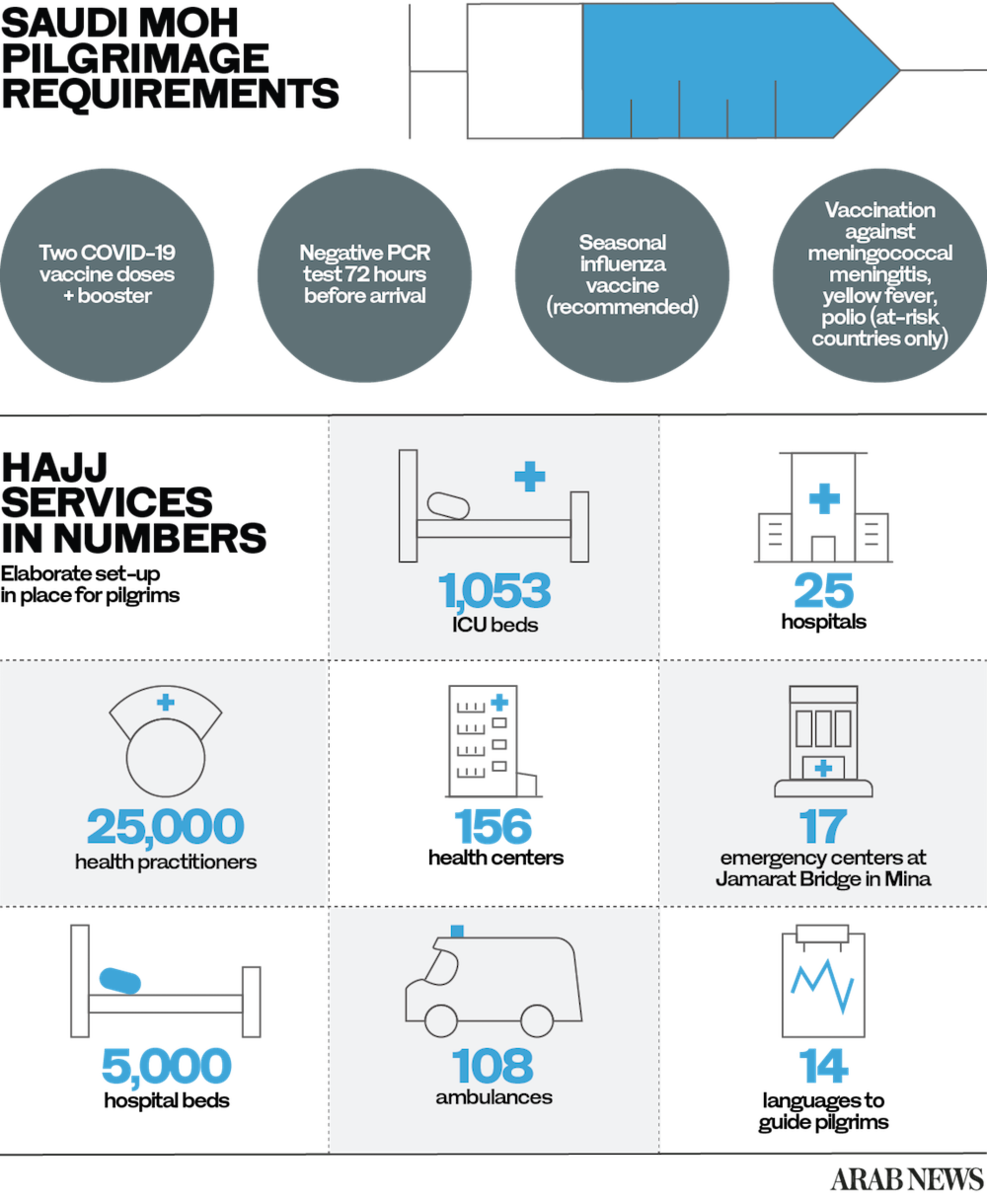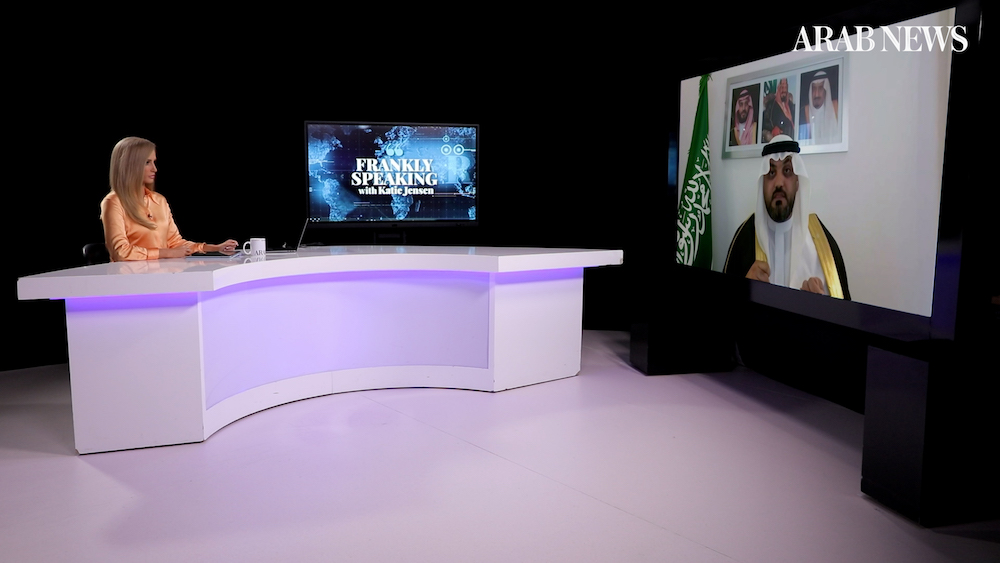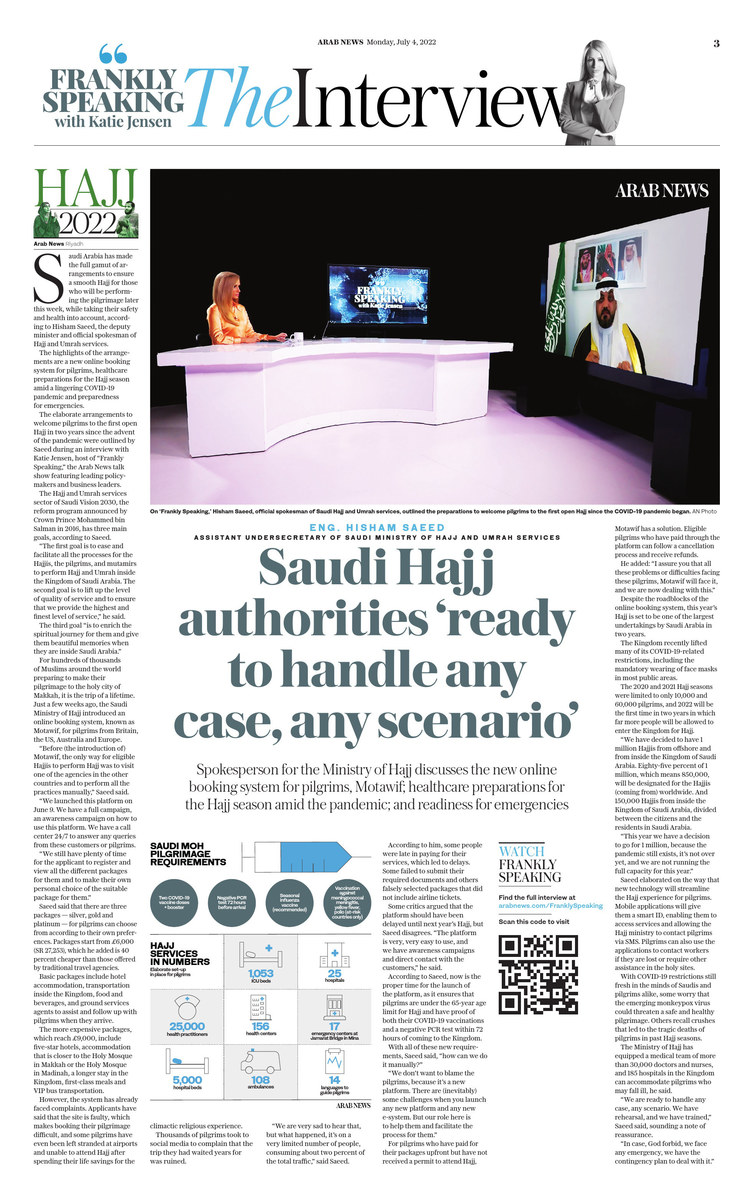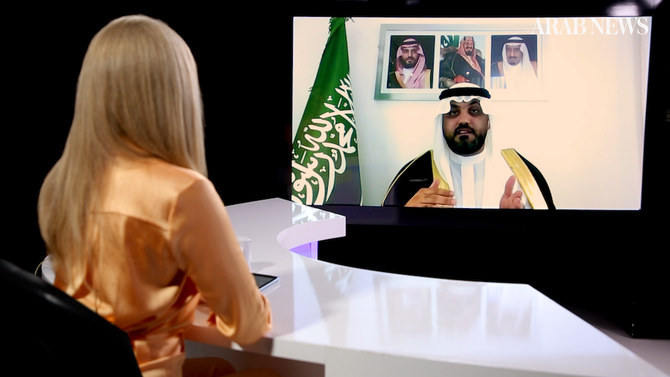RIYADH: Saudi Arabia has made the full gamut of arrangements to ensure a smooth Hajj for those who will be performing the pilgrimage later this week, while taking their safety and health into account, according to Hisham Saeed, the deputy minister and official spokesman of Hajj and Umrah services.
The highlights of the arrangements are a new online booking system for pilgrims, healthcare preparations for the Hajj season amid a lingering COVID-19 pandemic, and preparedness for emergencies.
The elaborate arrangements made by Saudi Arabia to welcome pilgrims to the first open Hajj in two years since the advent of the pandemic were outlined by Saeed during an interview with Katie Jensen, host of “Frankly Speaking,” the Arab News talk show on which leading policymakers and business leaders appear.
The Hajj and Umrah services sector of Saudi Vision 2030, the reform program announced by Crown Prince Mohammed bin Salman in 2016, has three main goals, according to Saeed.
“The first goal is to ease and facilitate all the processes for the Hajjis, the pilgrims, and mutamirs to perform Hajj and Umrah inside the Kingdom of Saudi Arabia. The second goal is to lift up the level of quality of service and to ensure that we provide the highest and finest level of service,” he said.
The third goal “is to enrich the spiritual journey for them and give them beautiful memories when they are inside Saudi Arabia.”

For hundreds of thousands of Muslims around the world preparing to make their pilgrimage to the holy city of Makkah, it is the trip of a lifetime. Just a few weeks ago, the Saudi Ministry of Hajj introduced an online booking system, known as Motawif, for pilgrims from Britain, the US, Australia and Europe.
“Before (the introduction of) Motawif, the only way for eligible Hajjis to perform Hajj was to visit one of the agencies in the other countries and to perform all the practices manually,” Saeed said.
“We launched this platform on June 9. We have a full campaign, an awareness campaign on how to use this platform. We have a call center 24/7 to answer any queries from these customers or pilgrims.
“We still have plenty of time for the applicant to register and view all the different packages for them and to make their own personal choice of the suitable package for them.”
Saeed explained that there are three packages — silver, gold and platinum — that pilgrims can choose from according to their own preferences. Packages start from £6,000 (SR 27,253), which he added is 40 percent cheaper than those offered by traditional travel agencies.
Basic packages include hotel accommodation, transportation inside the Kingdom, food and beverages, and ground services agents to assist and follow up with pilgrims when they arrive.
The more expensive packages, which reach £9,000, include five-star hotels, accommodation that is closer to the Holy Mosque in Makkah or the Holy Mosque in Madinah, a longer stay in the Kingdom, first-class meals, and VIP bus transportation.
However, the system has already faced complaints. Applicants have said that the site is faulty, which makes booking their pilgrimage difficult, and some pilgrims have even been left stranded at airports and unable to attend Hajj after spending their life savings for the climactic religious experience.

Spokesman for the Ministry of Hajj discussed the new online booking system for pilgrims, Motwatif, with Frankly Speaking. (AN Photo)
Thousands of pilgrims took to social media to complain that the trip they had waited years for was ruined.
“We are very sad to hear that, but what happened, it’s on a very limited number of people, consuming about two percent of the total traffic,” said Saeed.
According to him, some people were late in paying for their services, which led to delays, some failed to submit their required documents, and others falsely selected packages that did not include airline tickets.
Some critics argued that the platform should have been delayed until next year’s Hajj, but Saeed disagrees. “The platform is very, very easy to use, and we have awareness campaigns and direct contact with the customers,” he said.
According to Saeed, now is the proper time for the launch of the platform, as it ensures that pilgrims are under the 65-year age limit for Hajj and have proof of both their COVID-19 vaccinations and a negative PCR test within 72 hours of coming to the Kingdom.
With all of these new requirements, “how can we do it manually?” he said.
“We don’t want to blame the pilgrims, because it’s a new platform. There are (inevitably) some challenges when you launch any new platform and any new e-system. But our role here is to help them and facilitate the process for them.”
For pilgrims who have paid for their packages up front but have not received a permit to attend Hajj, Motawif has a solution. Eligible pilgrims who have paid through the platform can follow a cancellation process and receive refunds.
He added: “I assure you that all these problems or difficulties facing these pilgrims, Motawif will face it, and we are now dealing with this.”
Despite the roadblocks of the online booking system, this year’s Hajj is set to be one of the largest undertakings by Saudi Arabia in two years.
The Kingdom recently lifted many of its COVID-19-related restrictions, including the wearing of face masks in public in most areas.

The Hajj and Umrah services sector of Saudi Vision 2030, the reform program announced by Crown Prince Mohammed bin Salman in 2016, has three main goals, according to Saeed. (AN Photo)
The 2020 and 2021 Hajj seasons were limited to only 10,000 and 60,000 pilgrims respectively due to these restrictions, and 2022 will be the first time in two years in which far more people will be allowed to enter the Kingdom for Hajj.
“We have decided to have 1 million Hajjis from offshore and from inside the Kingdom of Saudi Arabia. Eighty-five percent of 1 million, which means 850,000, will be designated for the Hajjis (coming from) worldwide. And 150,000 Hajjis from inside the Kingdom of Saudi Arabia, divided between the citizens and the residents in Saudi Arabia.
“This year we have a decision to go for 1 million, because the pandemic still exists, it’s not over yet, and we are not running the full capacity for this year.”
Saeed elaborated on the way that new technology will streamline the Hajj experience for pilgrims. Mobile applications will give them a smart ID, enabling them to access services and allowing the Hajj ministry to contact pilgrims via SMS. Pilgrims can also use the applications to contact workers if they are lost or require other assistance in the holy sites.
With COVID-19 restrictions still fresh in the minds of Saudis and pilgrims alike, some worry that the emerging monkeypox virus could threaten a safe and healthy pilgrimage. Others recall crushes and stampedes which have led to the tragic deaths of pilgrims in past Hajj seasons.
In this context, Saeed said that some restrictions are still in place, such as the mandatory wearing of face masks in the holy sites of Muzdalifah, Mina and Arafat.
The Ministry of Hajj has also equipped a medical team of more than 30,000 doctors and nurses, and 185 hospitals in the Kingdom can accommodate pilgrims who may fall ill, he said.
“We are ready to handle any case, any scenario. We have rehearsal, and we have trained,” Saeed said, sounding a note of reassurance.
“In case, God forbid, we face any emergency, we have the contingency plan to deal with it.”




























